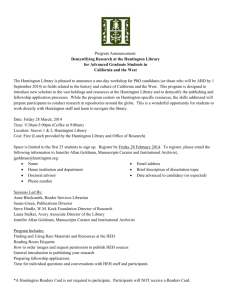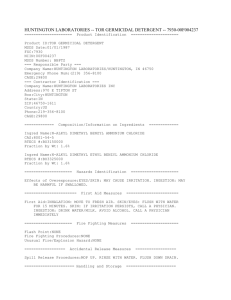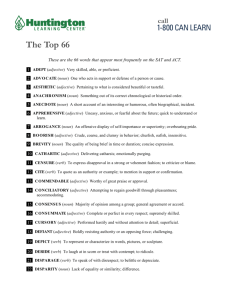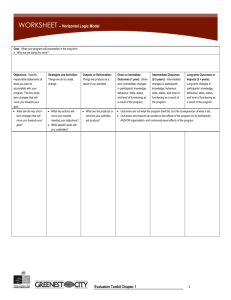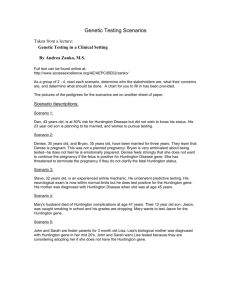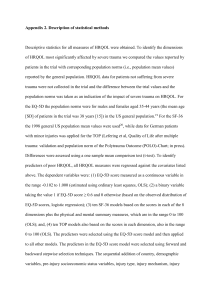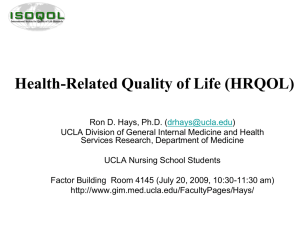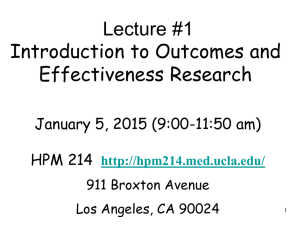Quality of Life & Huntington's disease
advertisement
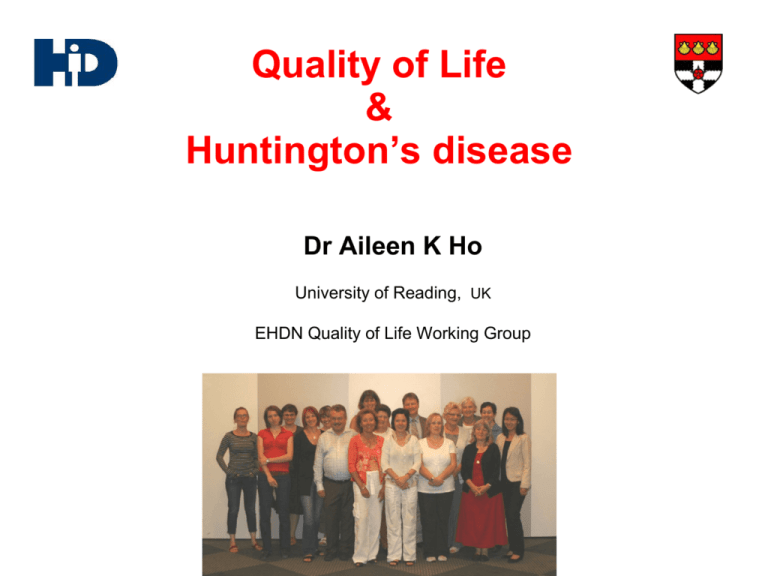
Quality of Life & Huntington’s disease Dr Aileen K Ho University of Reading, UK EHDN Quality of Life Working Group Reading Frequency of HD Harper, 2002 Biopychosocial model World Health Organisation International Classification of Functioning, Disability and Health framework Huntington’s disease (HD) HD brain HD movement HD thinking HD behaviour HD limitations HD HrQoL Affects life before birth – genetic disease George Huntington • Long Island, US • “hereditary chorea” • 1872 George Huntington (1850-1916) Molecular Genetics Affects the person from conception – abnormal HD cellular activity •Expansion of CAG repeat on the HD gene, chromosome 4p, IT15 gene •n Autosomal dominant (transmission risk 50%) (CAG)n [ 40] HD allele 40 [36- 39] HD allele with reduced penetrance 36 [27- 35] normal unstable allele 27 [6-27] normal allele 1 ATG 2 gene IT-15 CAG = glu (glutamine), or Q (CAG)n = polyglutamine), or polyQ exões Affects the brain – 20% reduction of whole brain weight Human brain: •~ 3 pounds (1400 grams) •e.g. cantaloupe •Generates enough electricity to power a 25-watt light bulb Dog brain: •~ 3 ounces (80 grams) •e.g. small kiwifruit Affects the brain – 50% loss of the brain’s basal ganglia Affects behaviour – the neuronal foundation of behaviour regulation is eroded Victorson et al 2014 Biopychosocial model World Health Organisation International Classification of Functioning, Disability and Health framework Huntington’s disease (HD) HD brain HD movement HD thinking HD behaviour HD limitations HD HrQoL According to WHO quality of life is: ‘individual’s perception of their position in life in context of the culture and value systems in which they live and in relation to their goals, expectations, standards and concerns’ (WHOQOL Group,1995) • Person-centered • Subjective • Patient-reported outcome measure 12 Quality of life (QOL) •Multi-dimensional construct and may include dimensions of physical, emotional, social, productive and material well-being, interpersonal relations, personal development, selfdetermination, social inclusion, and individual rights (Felce & Perry, 1995). Health-related quality of life (HrQOL) •Disease-specific measures address concerns or issues pertinent to a particular illness, and capture the impact of the condition, limitations or restrictions in function. HrQoL in Huntington’s disease … Biopychosocial model World Health Organisation International Classification of Functioning, Disability and Health framework Huntington’s disease (HD) HD brain HD movement HD thinking HD behaviour HD limitations HD HrQoL ‘‘If you really want to help somebody, first you must find out where he is. This is the true secret of caring … Helping somebody implies … [that] you must understand what he understands.’’ Interviews • Face-to-face • At home • Recorded • Semi-structured • Topics from the literature, operationalised HrQOL concept. ‘…Emotional well-being, spirituality, sexuality, social functioning, family life, occupational functioning, communication, eating, functional ability, physical status, treatment satisfaction, self-esteem, body image, future orientation… (Fitzpatrick 1996) • Open-ended questions and probes • Average 1 hour (1/2hr ~ 2hrs) • Verbatim transcription • 39 individuals interviewed Health professionals (2) Partners/carers (11) People with HD (26) HDQoL Available in 18 translations including Norweigian 100 0 •Self-report questionnaire •HD specific •Acceptable to patients & carers •Quick •Psychometric validation •Used in Clinical, Research, Care applications 6 Specific Scales - Physical & Functional - Cognitive - Mood State - Hopes & Worries - Self & Vitality - Services Thank You! Ongoing work •HDQOL 2nd validation study – Large well-characterised diverse sample - Check scale characteristics - Robust instrument •Electronic administration •Follow-up administration Biopychosocial model World Health Organisation International Classification of Functioning, Disability and Health framework Huntington’s disease (HD) HD brain Neuron HD movement HD thinking HD behaviour HD limitations HD QoL Whole person Thank You Dr Aileen K Ho a.k.ho@reading.ac.uk
